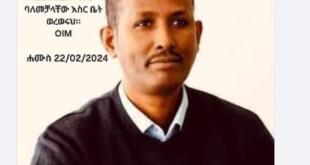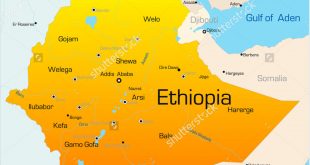Independent journalists in Ethiopia face grave threat of imprisonment if they criticise the state or its laws.
 Birtukan Mideksa is a fellow at Harvard University’s WEB Du Bois Institute for African and African American Research and a former prisoner of conscience in Ethiopia
Birtukan Mideksa is a fellow at Harvard University’s WEB Du Bois Institute for African and African American Research and a former prisoner of conscience in Ethiopia
March 30, 2013 (Aljazeera) — Although Ethiopia has its first new prime minister in 17 years – so far, the government has failed to right a long history of wrongs. With prisoners of conscience still languishing in its prisons, Ethiopia must receive the clear message – especially from allies like the United States – that continued human rights violations will not be tolerated.
My journey to become a political prisoner in Ethiopia began as a federal judge fighting to uphold the rule of law. Despite institutional challenges and even death threats, I hoped to use constitutional principles to ensure respect for basic rights.
But, having witnessed firsthand the government disregard for fundamental constitutional rules, I joined the opposition and became the first woman to hold a high-level position in an Ethiopian political party.
Our party – the Coalition for Unity and Democracy – contested the 2005 elections with a multiethnic platform based on economic liberalism and respect for individual rights. As momentum gathered, many hoped change had finally arrived in Ethiopia.
After the 2005 elections, Eskinder Nega and his wife – Serkalem Fasil – spent 17 months in prison [AP]
But after early reports showed our party ahead in the polls, the government dashed our optimism by throwing me and my colleagues behind bars and declaring a victory for the ruling party.
When I emerged after 21 months in prison, our party was outlawed and the political landscape had grown increasingly repressive. But we forged ahead, forming the new Unity for Democracy and Justice Party and continuing to advocate for dialogue and non-violent political reform in Ethiopia.
Authorities arrested me again in 2008, claiming that I had mischaracterised the circumstances of my release. But peaceful political activities are not the only way to become a prisoner of conscience in Ethiopia.
Independent journalists face the very real threat of imprisonment in response to their work. Authorities have detained my friend Eskinder Nega eight times over his 20-year career as a journalist and publisher.
After the 2005 elections, Eskinder and his wife – Serkalem Fasil – spent 17 months in prison. Pregnant at the time, Serkalem gave birth to a son despite her confinement and almost no pre-natal care.
Banned from publishing after his release in 2007, Eskinder continued to write online. In early 2011, he began focusing particularly on the protest movements then sweeping North Africa and the Middle East.
Eskinder, who does not belong to any political party because of a commitment to maintain his independence, offered a unique and incisive take on what those movements meant for the future of Ethiopia.
Committed to the principle of non-violence, Eskinder repeatedly emphasised that any similar movements in Ethiopia would have to remain peaceful. Despite this, police briefly detained him and warned him that his writings had crossed the line and he could face prosecution.
Then in September 2011, the government made good on that threat. Authorities arrested Eskinder just days after he publicly criticised the use of anti-terror laws to stifle dissent. They held him without charge or access to an attorney for nearly two months.
The government eventually charged Eskinder with terrorism and treason, sentencing him to 18 years in prison after a political trial. Unfortunately, Eskinder is not alone; independent journalists Woubshet Taye and Reeyot Alemu also face long prison terms on terrorism charges.
The legal advocacy organisation Freedom Now, the UN Working Group on Arbitrary Detention – a five-person panel of experts from around the world that consider individual cases – found Eskinder’s continued detention illegal under international law and called for his immediate release.
The UN specifically found that the government prosecuted Eskinder using overly broad terrorism charges because he exercised his internationally protected right to freedom of expression. It also held that procedural violations, such as denying Eskinder access to an attorney for nearly two months, violated his due process rights.
With this unequivocal finding by the UN, the international community can, and must, do more to help Eskinder and his imprisoned colleagues. In particular, the US, which has a close relationship with government in Addis Ababa, must speak out at every opportunity for those who cannot speak out for themselves from behind the prison walls.
Birtukan Mideksa is a fellow at Harvard University’s WEB Du Bois Institute for African and African American Research and a former prisoner of conscience in Ethiopia.
Follow her on Twitter: @Birtukanmideksa
![After the 2005 elections, Eskinder Nega and his wife - Serkalem Fasil - spent 17 months in prison [AP]](http://ayyaantuu.com/wp-content/uploads/2013/03/prisoners.jpg)




